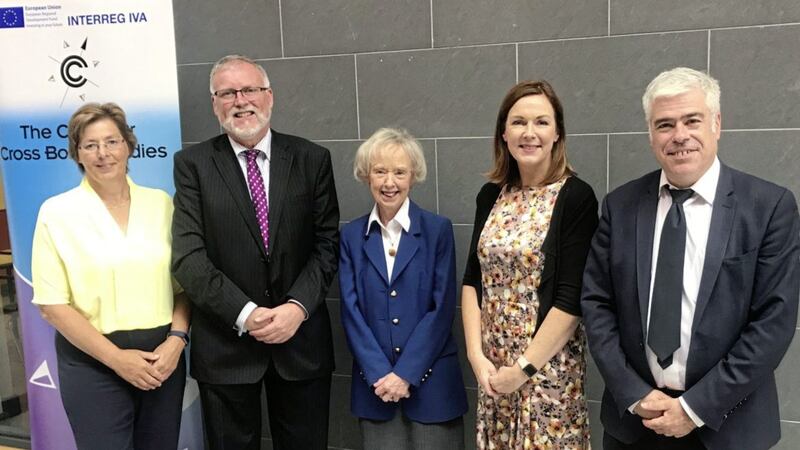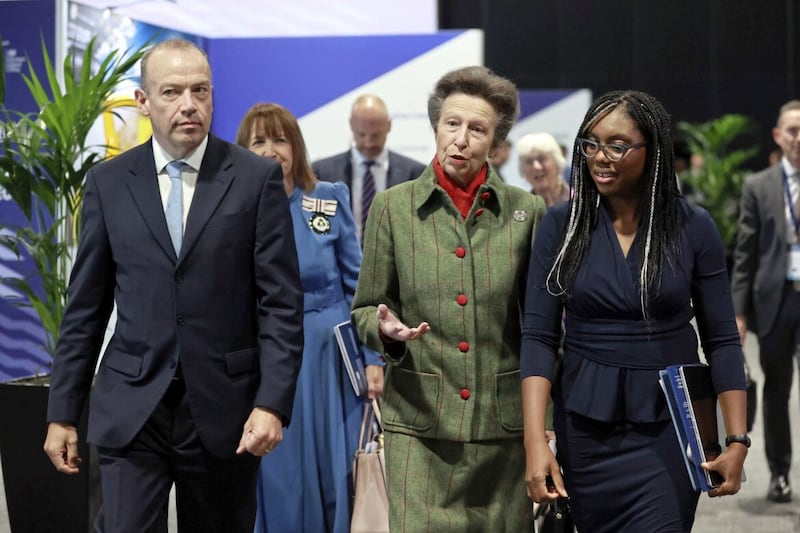LAST week I had the honour of delivering the annual Sir George Quigley lecture at Dublin City University. During the lecture, which is organised each year by the Centre of Cross Border Studies, I noted how today we are living through an extraordinary time of great uncertainty, much in part due to the current Brexit paralysis. But while there are serious risks ahead, there are also reasons to be optimistic.
Given the huge political, economic, social and even geographic challenges that are so apparent to this small region, I told the audience in Dublin that it is high time for Northern Ireland to start creating its own successful future.
As a Nobel Prize winner once famously said: ‘We can’t predict the future, but we can create it.’ So, in my lecture I focused on exploring the prospects for Northern Ireland’s economic future. First off, I outlined a vision of where I think our economy could and should be going, then I explored what necessary steps or actions might be required to deliver on that economic vision.
Most importantly, the principal focus must be on how we can make things better for the next generation. All of us should want to leave any environment over which we have some influence, whether it is economic, social or natural, in better shape than we found it.
So, what does that vision look like? It is one where our economy can deliver high, but sustainable, levels of growth and can punch above its weight on the world stage. An economy that has a highly educated and skilled workforce, one that is highly innovative, and one where investment in infrastructure makes a genuine difference to people’s daily lives.
Our economy should be one where enterprise can continue to flourish and the value of business to wider society is fully appreciated. Business knows it must do more to show how profit and purpose go hand-in-hand, while demonstrating it is a problem-solver, not a problem to be solved. But we should never forget that business is a force for good.
We must also aspire to having an economy that attracts inward investment from around the world and is somewhere international workers wish to come, work and settle. An economy which enables all citizens to have a better quality of life and provides opportunity for all regardless of age, gender, religion or sexual orientation. And it does not stop there, I would like to see our economy powered by clean energy and perhaps one that is able to help less fortunate states with their own development goals.
It is of course easy to say, easy to dream, to create a vision. But without an action plan, that vision will simply remain that. A distant dream. So how can we achieve these aspirations? As an economist my mind always moves towards those tried and tested drivers of economic growth – investment in education; in infrastructure and innovation & technological advancement. These drivers when pursued have rarely let economies down.
However, given the scale of the challenges that lie ahead, there are three other factors of influence that will determine our ability to achieve that economic vision. Those are: collaboration, culture and tolerance.
The recognition of collaborative relations across this island and between Ireland and Britain are an integral part of the Good Friday Agreement. Strands 2 and 3 of the Agreement deal in detail with these relationships. I reminded my audience that from 1998 to 2016 the levels of positive collaboration between Britain and Ireland intensified; for me the symbolic high point was the Queen’s visit to Dublin back in 2011.
The success in building those collaborative relations is evident in the UK government’s own research which shows there are now 142 areas of cross-border co-operation across the Irish border in areas such as agriculture, energy, environment, transport, security and health.
We also know from the most recent statistics that since the Good Friday Agreement and the removal of a hard border across the island, economic collaboration has flourished, and job creation has risen. Trade from NI to Ireland is now worth approximately £3.4 billion per annum and to Britain it was worth £14 billion. In 2017, UK exports to Ireland were worth £34.0 billion; imports from Ireland were £21.8 billion.
Good political and economic collaboration across the British-Irish isles will have a huge influence on Northern Ireland’s future economy. But given the political strains and tensions between Ireland, Britain and NI today, it is imperative that we all work towards restoring those relationships.
We must get the NI Executive back up and running. It has been absent for far too long. We must get the North-South Ministerial Council fully functioning once again. And we need to ensure that the British-Irish Council established under the Good Friday Agreement plays its full part in promoting those beneficial relationships between the two islands.
Culture is a second influencing factor. We urgently need to change mind-sets in the next generation by educating them on the needs of the future economy. We need to equip them with the right skills and excite them about the limitless possibilities ahead. In my lecture, I referred to the large pool of inactive people locally and the drain of young talent that leaves Northern Ireland to study elsewhere. Both government and industry need to work in partnership to inspire the next generation of workers to be economically active, well-educated and entrepreneurial.
Thirdly, the importance of tolerance should not be underestimated for our long-term economic success. The backward step towards nationalism that is on the rise today is not just a threat to Anglo-Irish relations, it’s a threat to the whole of the United Kingdom. While, Northern Ireland has made significant progress when it comes to tolerance, we must admit that there is still some way to go.
If we are truly to achieve that economic vision I painted earlier, then we must send an outward to signal to the world that we are tolerant people. We must champion diversity, we must ensure economic opportunity for all and we must legislate widely for equal rights for women, for the LGBT community, for migrant workers and for minority groups.
If we can combine those influencing factors alongside the traditional drivers of growth, Northern Ireland can look forward to a bright future for the economy and the next generation. A positive vision that becomes a successful plan for the years ahead.
:: Angela McGowan is director of CBI Northern Ireland. Follow her at @angela_mcgowan







